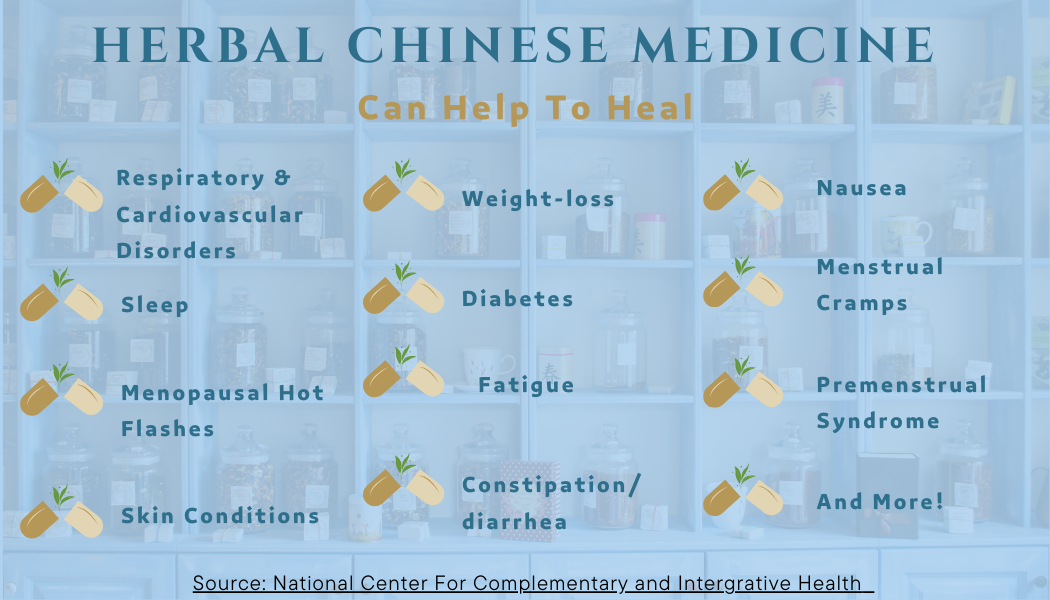Benefits of Herbal Chinese Medicine
Chinese Medicine has been used for thousands of years to treat a variety of health conditions. This article explores how Chinese Medicine, particularly through the use of Chinese herbal medicine and acupuncture, can help alleviate symptoms related to fatigue, sleep disorders, menopausal hot flashes, skin conditions, weight loss, respiratory and cardiovascular disorders, diabetes, gastrointestinal issues, nausea, menstrual cramps, and premenstrual syndrome (PMS).
Fatigue
Fatigue can be a result of various underlying issues, including stress, poor diet, and lack of sleep. Chinese Medicine approaches fatigue by balancing the body’s energy (Qi) and improving the function of organs such as the liver and spleen. Herbs like ginseng and astragalus are commonly used to boost energy levels and enhance overall vitality.
Sleep Disorders
Sleep disorders, including insomnia, are often treated in Chinese Medicine by addressing imbalances in the heart and liver meridians. Herbs such as Suan Zao Ren (Ziziphus jujuba) and Bai Zi Ren (Platycladus orientalis) are used to calm the mind and promote restful sleep. Acupuncture can also be effective in regulating sleep patterns by balancing the body’s energy flow.
Menopausal Hot Flashes
Menopausal hot flashes are commonly treated with Chinese Medicine by addressing yin deficiencies in the kidneys and liver. Acupuncture and herbs such as Dong Quai (Angelica sinensis) and Bai Shao (Paeonia lactiflora) are used to nourish yin and clear heat, thereby reducing the frequency and severity of hot flashes.
Skin Conditions
Skin conditions like eczema and psoriasis are often seen as manifestations of internal imbalances in Chinese Medicine. Herbs such as Huang Qin (Scutellaria baicalensis) and Ku Shen (Sophora flavescens) are used to clear heat and dampness from the body, which can help alleviate skin irritations and inflammations.
Weight Loss
Weight loss in Chinese Medicine is approached by improving digestion and metabolism. Herbs like Huang Qi (Astragalus membranaceus) and Fu Ling (Poria cocos) are used to strengthen the spleen and reduce dampness, which can aid in weight management. Acupuncture can also be used to regulate appetite and improve metabolic functions.
Respiratory & Cardiovascular Disorders
For respiratory issues such as asthma and bronchitis, Chinese Medicine uses herbs like Ma Huang (Ephedra sinica) and Xing Ren (Prunus armeniaca) to open the airways and reduce phlegm. Cardiovascular health is supported by herbs such as Dan Shen (Salvia miltiorrhiza) and Hong Hua (Carthamus tinctorius), which improve blood circulation and reduce blood stasis.
Diabetes
Chinese Medicine treats diabetes by regulating blood sugar levels and improving pancreatic function. Herbs like Huang Lian (Coptis chinensis) and Tian Hua Fen (Trichosanthes kirilowii) are used to clear heat and reduce blood glucose levels. Acupuncture can also help improve insulin sensitivity and balance the body’s energy.
Gastrointestinal Issues
For gastrointestinal issues like constipation and diarrhea, Chinese Medicine uses herbs such as Da Huang (Rheum palmatum) for constipation and Bai Zhu (Atractylodes macrocephala) for diarrhea. These herbs help regulate the digestive system and restore balance to the spleen and stomach.
Nausea
Nausea is often treated in Chinese Medicine by addressing imbalances in the stomach and spleen meridians. Herbs like Sheng Jiang (Zingiber officinale) and Ban Xia (Pinellia ternata) are used to harmonize the stomach and reduce nausea.
Menstrual Cramps and Premenstrual Syndrome (PMS)
Menstrual cramps and PMS are treated by regulating the flow of Qi and blood in the liver and spleen meridians. Herbs such as Dang Gui (Angelica sinensis) and Chuan Xiong (Ligusticum chuanxiong) are used to relieve pain and improve blood circulation. Acupuncture can also be effective in alleviating menstrual discomfort and balancing hormones.
Conclusion
In conclusion, Chinese Herbal medicine provides a comprehensive and holistic approach to health and wellness, addressing a wide array of conditions from fatigue and sleep disorders to menopausal hot flashes, skin conditions, weight loss, respiratory and cardiovascular disorders, diabetes, gastrointestinal issues, nausea, menstrual cramps, and premenstrual syndrome (PMS). By focusing on the underlying imbalances within the body’s energy (Qi) and organ systems, Herbal Chinese Medicine aims to restore harmony and promote overall well-being. Through the use of carefully selected herbs and acupuncture, It offers a natural and effective alternative or complement to conventional medical treatments. Whether you’re seeking relief from chronic conditions or looking to improve your general health, Herbal Chinese Medicine provides a valuable and time-tested approach to achieving and maintaining optimal health.
Wishing you health and harmony,
Miriam Pineles
Dr. Miriam Pineles, DACM

